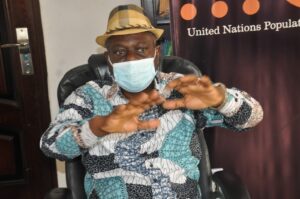Dr Omolaso Omosehin, Assistant Reps, United Nations Population Fund (UNFPA), says the issue of stigmatisation of people living with HIV and COVID-19 is a major concern to the fund.
Omosehin, also the Head, Lagos Liaison office of UNFPA, said the fund had integrated messages against stigma into its awareness campaign.
In an interview with the News Agency of Nigeria in Lagos, he urged the public to shun stigmatisation, show kindness and support people that are sick.
“In the case of HIV, the stigma has reduced; in any case, you are not required to disclose your status, except you want to, and that has helped to remove the stigma.

“Someone may have HIV, and you may never know, because he is taking his drugs.
“The message and awareness about HIV is there, that if you shake hands, hug or even kiss someone with HIV, you won’t get the infection, that has helped to reduce the stigma.
“Unlike COVID-19, if someone coughs near you or shows other symptoms of the virus, you will pull back, mask up, even advise the person to keep a distance,” he said.
On whether the threat of COVID-19 was bigger than HIV, Omosehin said everyone was susceptible to COVID-19 infection, adding that adequate preventive measure was critical to reducing one’s risk of infection.
He said, “COVID-19 comes suddenly, and may have a fatal outcome, unlike HIV/AIDS. At the onset of HIV/AIDS, it was a fatalistic infection, because lots of people died.
“Now, HIV is no longer a death sentence. We don’t expect anyone to die of HIV, except they are not diagnosed on time.
“If you are diagnosed, and you have HIV, you can receive treatment and live a normal life.”
According to him, though HIV is a life-time scourge, because a carrier never really gets cured, COVID-19 is not a life-time disease, except now that it has become a pandemic.
He said the nature of the virus kept changing, adding that no one knows when the virus would end, except a vaccine comes.
Omosehin advised Nigerians to embrace precautionary measures against COVID-19 pandemic, saying “the present strain is more virulent than before’’.
He said that ages of those who developed complications after contracting the virus had dropped from the elderly to the middle age.
“Let nobody live under the impression that COVID-19 is gone; in fact, the virus we have now is more virulent than the virus we had before.
“We need to continue to observe social distancing, masking up, and regular washing of hands.
“There are many things that can retain the virus for a period of time; so, don’t live under the impression that your hands are clean.
“Restrict your visit to only places that are important to reduce your chances of catching the virus,” he said.
On Nigerians’ attitude to COVID-19, Omosehin said some people believed that COVID-19 doesn’t exist, while some propounded theories about the virus, which affects their perception and reactions to the virus.
“We have that false information that is causing confusion,” he said.
The UNFPA head in Lagos said lifting of the lockdown gave some people a false confidence that the pandemic was over.
He said that it was far from being over with a second wave of COVID-19 infection currently affecting some countries.

